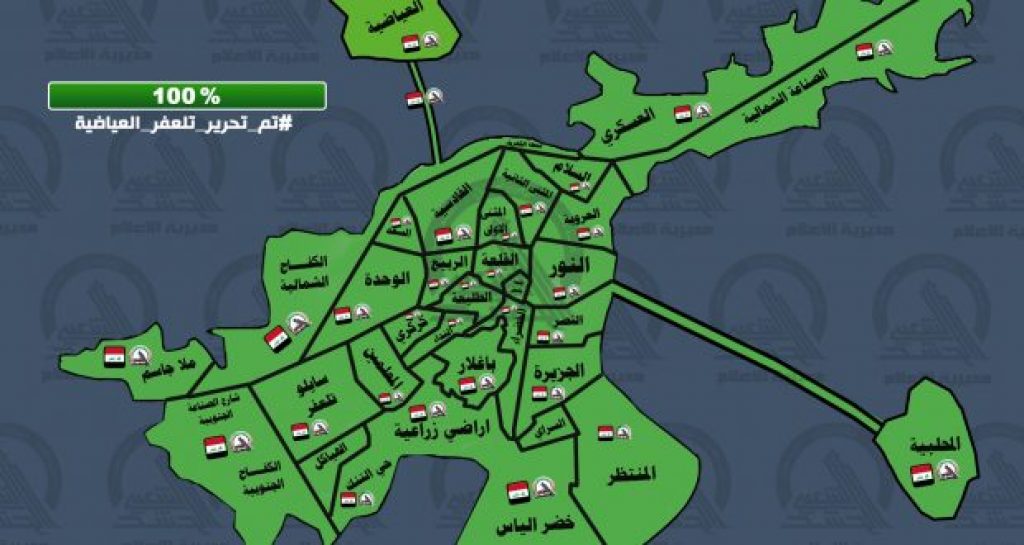
A map of Tal Afar posted on Popular Mobilization Forces (PMF) websites.
Iraqi prime minister Haider Al-Abadi announced earlier today that Tal Afar has been “liberated” from the Islamic State. “Our brave Armed Forces have liberated Tal Afar and the Iraqi flag is once again flying high in Nineveh province,” Al-Abadi tweeted. “I salute our martyrs, our injured and their families whose sacrifices have made this and other victories possible,” he added. “Nineveh is liberated.”
The US echoed Al-Abadi’s announcement, trumpeting the quick progress made by Iraqi forces.
“The global Coalition to defeat ISIS congratulates Prime Minister Al-Abadi and all Iraqi Security Forces on their stunning victory in Tal Afar and Northern [Nineveh] Province,” Combined Joint Task Force – Operation Inherent Resolve (CJTF-OIR) said in a statement. But CJTF-OIR added a cautionary note: “While the city and critical infrastructure are under ISF [Iraqi Security Forces] control, dangerous work remains to completely remove explosive devices, identify ISIS fighters in hiding and eliminate any remaining ISIS holdouts so they do not threaten the security of Tal Afar in the future.”
Iraqi forces declared victory in Tal Afar in remarkably short order. CJTF-OIR announced the start of the operation on Aug. 20. Less than one week later, Iraqi forces had captured most of the city.
Tal Afar is the midpoint along the strategically significant road connecting Mosul to the Iraq-Syria border. The Islamic State had controlled Tal Afar since June 2014. Although a robust defense was expected, Iraqi forces encountered minimal resistance. The self-declared caliphate’s resources in the area may have been depleted during the battle for Mosul, during which hundreds of suicide bombers and other improvised weapons of war were deployed over the course of nine months. Some Islamic State fighters likely retreated from the area ahead of the battle for Tal Afar as well.
Despite the Islamic State’s stiff resistance in Mosul, the city fell to Iraqi forces, including the Popular Mobilization Forces (PMF), in July. The PMF is led by Abu Mahdi al Muhandis, a US-designated terrorist who works with Iran’s Islamic Revolutionary Guard Corps (IRGC). The PMF includes militias backed by Iran and which attacked American forces in the past.
The Tal Afar airbase was recaptured by the PMF in Nov. 2016 and was used as a staging ground for the assault. The Iraqi forces participating in the offensive in Tal Afar included three Iraqi army divisions, the Counterterrorism Service (CTS), Federal Police, and the PMF. The Kurdish Regional Government Peshmerga also took part. The Coalition provided precision strikes, intelligence, training, and combat advice.
The Islamic State’s defenses paled in comparison to American expectations, allowing Iraqi forces to proceed more quickly than anticipated. Major General Rupert Jones, deputy commander general for CJTF-OIR, explained last week that “we should expect it to be a tough fight.” However, the Sunni jihadists’ mobile and static defenses proved ineffectual. The Islamic State sent VBIEDs (vehicle-borne improvised explosive devices) towards Iraqi forces and also prepared static defenses, including tunnel networks. Iraqi forces seized a 250 kilometer tunnel network on Aug. 21. Coalition airstrikes struck numerous tunnels and VBIED factories.
Although a meaningful victory, the Islamic State maintains additional positions throughout Iraq. Western portions of the Euphrates River Valley remain under the group’s control. The jihadists still hold the Hawija pocket, a zone between Kirkuk and the Tigris River from which they can launch attacks against Baiji, Tikrit, and Kirkuk. For example, the Islamic State killed seven soldiers in a suicide attack in Baiji in mid-August. The Hawija pocket abuts the Hamrin Mountains, which then connect to Islamic State support zones in Diyalah and Salah ad-Din provinces. A Peshmerga commander reportedly announced that an offensive to recapture Hawija will follow the Kurdish referendum, scheduled for Sept. 25.







